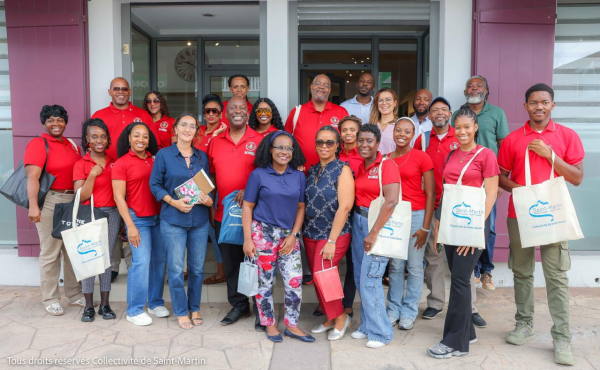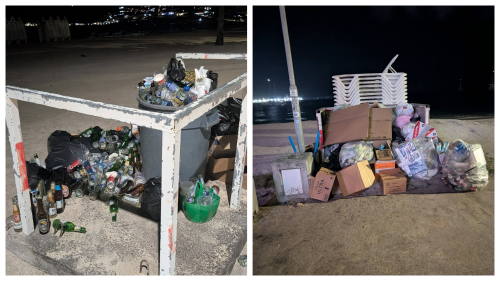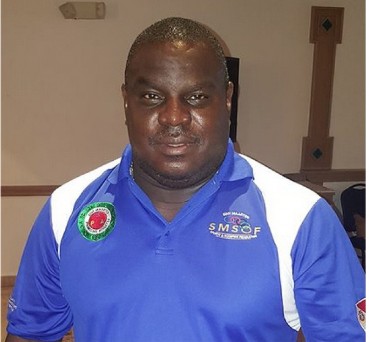 Cole Bay:--- In an atmosphere of fellowship, pride, and a deep commitment to Rotary’s humanistic values, the Rotary Club of St. Martin Sunset hosted its 2026 Professional Service Awards Evening at Carl’s N Son in Cole Bay. The event brought together Rotarians, local leaders, partners, and guests for a heartfelt celebration of professional excellence, service to others, and a shared responsibility to build a brighter future for the island’s youth.
Cole Bay:--- In an atmosphere of fellowship, pride, and a deep commitment to Rotary’s humanistic values, the Rotary Club of St. Martin Sunset hosted its 2026 Professional Service Awards Evening at Carl’s N Son in Cole Bay. The event brought together Rotarians, local leaders, partners, and guests for a heartfelt celebration of professional excellence, service to others, and a shared responsibility to build a brighter future for the island’s youth.
More than a traditional awards ceremony, the evening highlighted the essential role professionals play in shaping a more compassionate and inclusive society. Guided by Rotary’s motto Service Above Self, the event emphasized the importance of viewing one’s career not only as a livelihood, but also as a platform for positive contribution, especially in the lives of young people.
Professional Service, one of Rotary International’s core areas of focus, calls on individuals to lead with integrity, uphold high ethical standards, and use their expertise for the greater good. For the Rotary Club of St. Martin Sunset, this commitment extends beyond the workplace to mentorship, youth development, and the creation of opportunities that empower the next generation to thrive.
The evening’s keynote address was delivered by Peggy Ann Dros, Head of the Department of Labor and Social Affairs in Sint Maarten, who emphasized that a vocation should be more than a job and that it should reflect one’s personal mission. She encouraged professionals to see their careers as vehicles for positive impact, capable of inspiring, uplifting, and guiding young people toward a promising future.
“Professional Service is at the heart of who we are as Rotarians,” said club president Alex PIERRE. “It means using our professions as a force for good, leading with integrity, and making a real and lasting difference in the lives of others, especially the youth who will shape tomorrow.”
The highlight of the evening was the presentation of the 2026 Professional Service Awards, honoring six individuals whose careers exemplify excellence, ethical leadership, and a sincere commitment to service.
This year’s honorees were Guillaume Gorlier, Leonardo Richardson, Jacques Hamlet, Alberto Brooks, Michael Granger, and Luciana Raspail.
Each recipient was recognized not only for professional achievements but also for the way they dedicate their skills, influence, and time to serving others. Several honorees are actively involved in youth mentorship, support of educational initiatives, and guiding young professionals toward meaningful career paths. Their stories reflect the belief that true success is measured not only by accomplishments but by the positive impact left on others.
“Each of our honorees represents the very best of the values we strive to uphold,” added President Alex Pierre. “Their leadership reminds us that service does not end when the workday does. It lives in how we show up for others and how we invest in our youth.”
Throughout the evening, warm exchanges among guests reinforced the spirit of connection and fellowship that defines Rotary. The event served both as a celebration and a call to action, reminding all present that every profession holds the power to inspire, mentor, and uplift.
The Rotary Club of St. Martin Sunset remains a driving force on the island through service projects, strong partnerships, and initiatives aimed at creating lasting impact. Central to its mission is youth empowerment, including support for educational programs and the development of leadership opportunities that help young people build confidence, skills, and a lifelong commitment to service.
The evening concluded with heartfelt thanks to the members, partners, and supporters who made the event possible. By celebrating professional excellence, the Rotary Club of St. Martin Sunset reaffirmed its commitment to fostering a more ethical, caring, and service-driven society, one that places youth at the center of its vision.
Those interested in learning more about the Rotary Club of St. Martin Sunset and its initiatives, particularly those focused on youth, are encouraged to contact the club and explore ways to get involved.
The Rotary Club of St. Martin Sunset meets on the second and fourth Monday of the month at Carl N Sons Unique Inn and Conference Facilities in Colebay at 7:30 pm. The club can be contacted via email at This email address is being protected from spambots. You need JavaScript enabled to view it. or via the official Facebook page at facebook.com/rotarysxmsunset.
 Philipsburg/Marigot:--- On February 26, the Department of Communication of the Government of Sint Maarten paid a working visit to their French side counterparts of the Collectivité of Saint-Martin, Communication Department, which includes the protocol section.
Philipsburg/Marigot:--- On February 26, the Department of Communication of the Government of Sint Maarten paid a working visit to their French side counterparts of the Collectivité of Saint-Martin, Communication Department, which includes the protocol section. PHILIPSBURG:--- With barely a month left before the current waste management contracts expire, the Ministry of VROMI remains suspiciously silent, leaving contractors in limbo and the country on the brink of a sanitation crisis. The handling of the new garbage collection contracts, set to commence April 1, 2026, has devolved into a spectacle of incompetence, marked by flawed Terms of Reference (TOR), unanswered bids, and a desperate scramble to hide administrative failures.
PHILIPSBURG:--- With barely a month left before the current waste management contracts expire, the Ministry of VROMI remains suspiciously silent, leaving contractors in limbo and the country on the brink of a sanitation crisis. The handling of the new garbage collection contracts, set to commence April 1, 2026, has devolved into a spectacle of incompetence, marked by flawed Terms of Reference (TOR), unanswered bids, and a desperate scramble to hide administrative failures. Willemstad:--- Emsley Tromp, the former president-director of the Central Bank of Curaçao and Sint Maarten (CBCS), has had his conditional prison sentence upheld in an appeal. Tromp was sentenced to six months of conditional imprisonment, with a two-year probation period, for falsification of documents.
Willemstad:--- Emsley Tromp, the former president-director of the Central Bank of Curaçao and Sint Maarten (CBCS), has had his conditional prison sentence upheld in an appeal. Tromp was sentenced to six months of conditional imprisonment, with a two-year probation period, for falsification of documents. PHILIPSBURG:--- The Prosecutor’s Office has confirmed the extension of pretrial detention for Aartwich Bell, a former prison official and gym trainer, to 60 days as they prepare to take the case to court. This decision underscores the gravity of the allegations and the ongoing investigation into the case.
PHILIPSBURG:--- The Prosecutor’s Office has confirmed the extension of pretrial detention for Aartwich Bell, a former prison official and gym trainer, to 60 days as they prepare to take the case to court. This decision underscores the gravity of the allegations and the ongoing investigation into the case. Cole Bay:--- In an atmosphere of fellowship, pride, and a deep commitment to Rotary’s humanistic values, the Rotary Club of St. Martin Sunset hosted its 2026 Professional Service Awards Evening at Carl’s N Son in Cole Bay. The event brought together Rotarians, local leaders, partners, and guests for a heartfelt celebration of professional excellence, service to others, and a shared responsibility to build a brighter future for the island’s youth.
Cole Bay:--- In an atmosphere of fellowship, pride, and a deep commitment to Rotary’s humanistic values, the Rotary Club of St. Martin Sunset hosted its 2026 Professional Service Awards Evening at Carl’s N Son in Cole Bay. The event brought together Rotarians, local leaders, partners, and guests for a heartfelt celebration of professional excellence, service to others, and a shared responsibility to build a brighter future for the island’s youth.